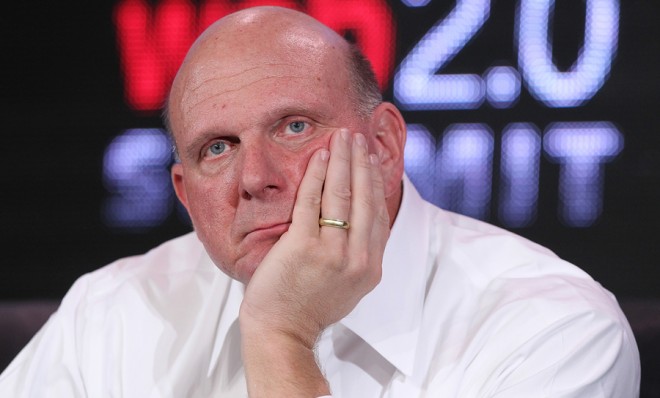4 smart takes on Steve Ballmer's Microsoft legacy
The CEO of Microsoft will retire within the year. How will he be remembered?

A free daily email with the biggest news stories of the day – and the best features from TheWeek.com
You are now subscribed
Your newsletter sign-up was successful
Steve Ballmer's reign of failure is over, said Nicholas Thompson at The New Yorker. When the Microsoft CEO announced last week that he would retire within the year, "the company's stock surged" — and that should surprise no one. When Ballmer took over Microsoft in 2000, the company "was one of the most powerful and feared companies in the world," and it's mostly his fault that today "it's a sprawling shadow." Ballmer "proved to be the anti–Steve Jobs," missing the boat on every major technology trend, including social networking. He alienated customers and dragged his feet on addressing growing markets. His leadership "has done more to defang Microsoft" than government regulators once concerned about its monopoly power could have ever hoped to do. The question now is whether Microsoft's next leader can revive the ailing company. But as for Ballmer: Good riddance.
The true mark of Ballmer's failure is that despite his efforts, Microsoft is "still not a consumer company," said Derek Thompson at The Atlantic. Instead of building products people love to use, it "builds things people — and, particularly, business-people — think they have to use," like Excel and Windows. Ballmer didn't commit "some obvious product flop or some famous design snafu." But the only real consumer success he can claim is the Xbox, and he committed the cardinal oversight of missing out on the inexorable rise of mobile computing. In the end, Ballmer's "tenure will probably be judged by the things he didn't make and the big picture he didn't see."
Cut the man some slack, said Timothy B. Lee in The Washington Post. "Ballmer wasn't a bad manager. He just had terrible timing." During his 13-year tenure, "he was swimming against some very powerful economic currents." He inherited a company that was, for the most part, inextricably dependent on the success of the PC. He wasn't blind to the rise of mobile technology. "To the contrary, he has spent the last decade working feverishly to position Microsoft to respond effectively," pouring millions into web apps and mobile and tablet computing. But such "disruptive innovations" are always hard for large, incumbent companies that make lavish profits on older technology. It's no surprise Microsoft was "always a day late and a dollar short."
The Week
Escape your echo chamber. Get the facts behind the news, plus analysis from multiple perspectives.

Sign up for The Week's Free Newsletters
From our morning news briefing to a weekly Good News Newsletter, get the best of The Week delivered directly to your inbox.
From our morning news briefing to a weekly Good News Newsletter, get the best of The Week delivered directly to your inbox.
CEOs of all stripes should consider this a cautionary tale, said Julia Kirby in Harvard Business Review. The heated debate over Ballmer's legacy "has focused almost entirely on the leadership of innovation," a topic that became a universal obsession in the course of Steve Jobs's decline. We've long known that legacy organizations struggle with innovation, but now we're learning that "innovation is the be-all and end-all in every business, and that the quality of leadership is a big factor in determining where it happens." Inspiring real change can be "an awkward affair," a little like "right-handed people writing with their left hands." But successful leaders — including Microsoft's next CEO — had better be thinking hard about innovation. "This is how you, too, will be judged."
A free daily email with the biggest news stories of the day – and the best features from TheWeek.com
Sergio Hernandez is business editor of The Week's print edition. He has previously worked for The Daily, ProPublica, the Village Voice, and Gawker.
-
 Political cartoons for February 21
Political cartoons for February 21Cartoons Saturday’s political cartoons include consequences, secrets, and more
-
 Crisis in Cuba: a ‘golden opportunity’ for Washington?
Crisis in Cuba: a ‘golden opportunity’ for Washington?Talking Point The Trump administration is applying the pressure, and with Latin America swinging to the right, Havana is becoming more ‘politically isolated’
-
 5 thoroughly redacted cartoons about Pam Bondi protecting predators
5 thoroughly redacted cartoons about Pam Bondi protecting predatorsCartoons Artists take on the real victim, types of protection, and more